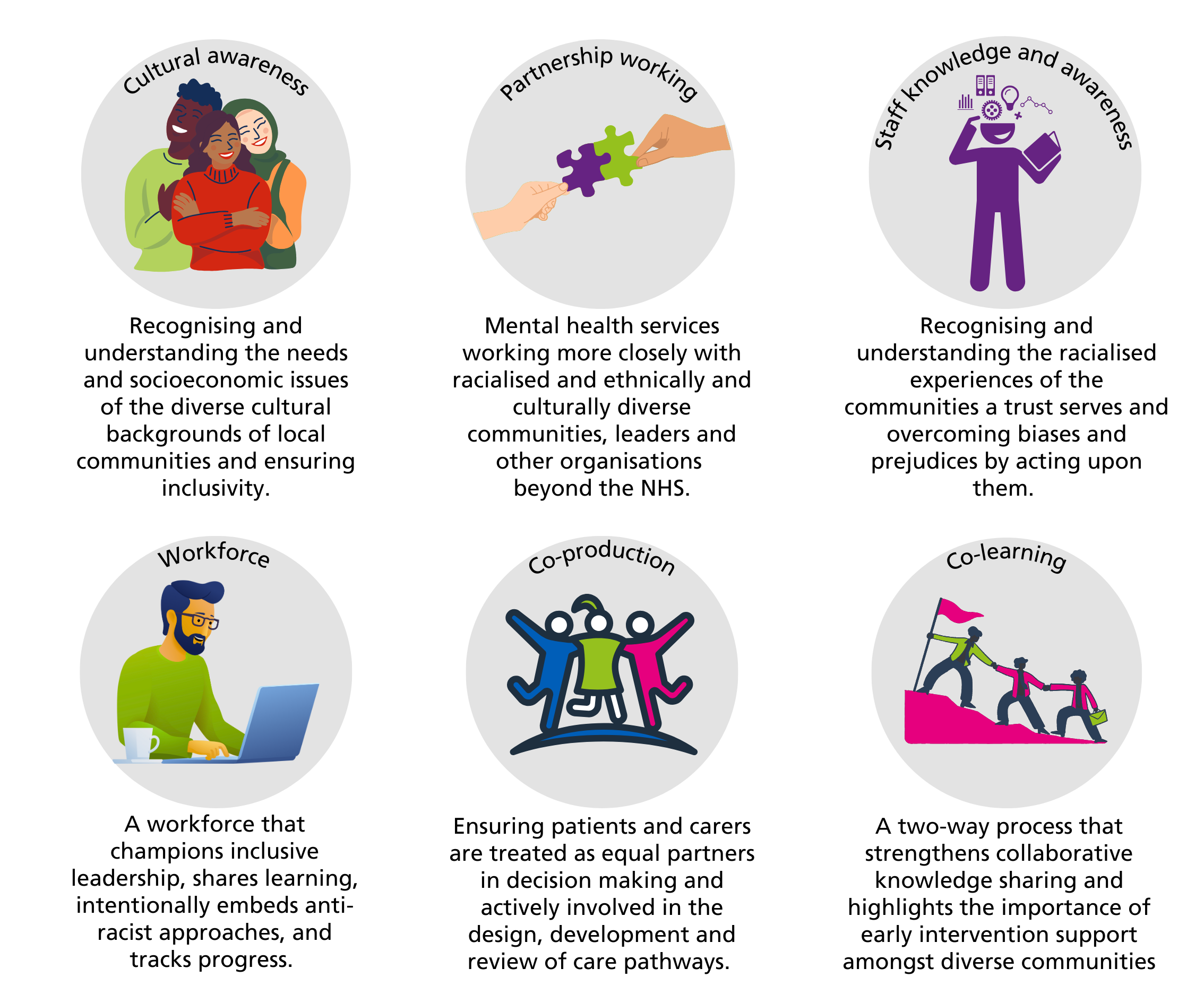We are committed to fostering equality and improving the experiences of racialised communities in mental health services.
As part of this commitment, we are implementing the Patient and Carer Race Equality Framework (PCREF) to drive meaningful change across our organisation.
What is PCREF?
The PCREF is a national framework designed to address racial disparities in mental health services, ensuring that care is equitable, culturally appropriate, and responsive to the needs of diverse communities.
Through this framework, we aim to improve access, service quality, and outcomes for racialised patients and their carers.
Key areas of implementation:
Leadership and Governance
Appointing a dedicated lead, embedding accountability structures and integrating PCREF into trust policies.
- Executive Lead – Kenny Laing, Chief Nursing Officer
- Lived Experience Co-Chair – Sherrine Khan
- Programme Lead – Zoe Grant, Deputy Chief Nursing Officer
- EDI (Equality, Diversity and Inclusion) Lead – Lesley Faux
- Patient Experience lead – Jayne Simner, Recovery and Experience Lead
Training and competencies
Providing staff with cultural competence and anti-racism training to enhance service delivery.
Nationally co-produced competencies
NHS England worked alongside PCREF pilot trusts, early adopter sites, communities, NHS staff, voluntary sector organisations and other key stakeholders over the past three years, working to identify what a ‘culturally competent’ trust is.
Views were wide-ranging and varied depending on the community make-up, local context and existing practices and approaches within each trust.
These six key competencies were identified; cultural awareness, staff knowledge and awareness, partnership working, workforce, co-learning and co-production.

We have conducted our own self-assessment against these competencies and will form the basis for our approach to implementation;
Cultural awareness
Recognising and understanding the needs of the diverse cultural backgrounds of the communities a trust serves. This encompasses awareness of and sensitivity to socioeconomic issues faced by local populations, to ensure services are more inclusive.
Staff knowledge and awareness
Recognising and understanding the racialised experiences of the communities a trust serves and overcoming biases and prejudices by acting upon them.
Partnership working
This means that mental health services work more closely with racialised and ethnically and culturally diverse communities, leaders and other organisations beyond the NHS, such as religious groups, ethnic led VCSE organisations, social care and others to support wellness in the round.
Co-production
Ensuring ethnically and culturally diverse patients and carers are treated as equal partners in decision making on their care and treatment plans, and actively involved in the design, development and review of care pathways. When describing a service, project or piece of work as coproduced, this must mean power-sharing from design to delivery.
Co-learning
This is a two-way process that strengthens collaborative knowledge sharing beyond co-production principles and focuses on how trusts can raise awareness of early intervention support amongst racialised and ethnically and culturally diverse communities and learn more about community concerns and barriers in return.
Workforce
A culturally competent and diverse workforce that has a positive impact on patient and carers from racialised and ethnic minority communities; and creates a safe space where the workforce champions inclusive leadership, shares learning, intentionally embeds anti-racist approaches, and tracks progress.
Additional local considerations:
1. Intersectionality
Key intersectional factors in mental health
Race and ethnicity
Racialised communities experience higher levels of stress due to systemic discrimination, racial trauma, and socioeconomic disparities.
Mistrust in mental health services is common due to historical mistreatment, such as unethical medical experiments (e.g. the Tuskegee Syphilis Study) and racial bias in diagnosis.
Black and Asian communities, for example, are often underdiagnosed for mood disorders but over diagnosed for psychotic disorders, leading to disproportionate use of coercive treatments.
Gender and sexual orientation
Women, particularly women of colour, face higher rates of gender-based violence and workplace discrimination, contributing to increased anxiety and depression rates.
LGBTQ+ individuals, especially transgender people of colour, encounter higher rates of mental health struggles due to transphobia, homophobia, and lack of culturally competent care.
Conversion therapy, misgendering, and lack of affirming healthcare contribute to worse mental health outcomes.
Disability and neurodivergence
Disabled individuals, particularly those from racialised backgrounds, often experience medical neglect, ableism, and economic hardship, exacerbating mental health conditions.
Neurodivergent individuals (e.g. those with ADHD or autism) from marginalised communities are frequently undiagnosed or misdiagnosed, leading to increased distress and lack of proper support.
Class and socioeconomic status
Financial stress, job insecurity, and unstable housing contribute to higher rates of anxiety, depression, and PTSD.
Marginalised individuals are more likely to be uninsured or underinsured when it comes to health insurance in countries where there is no national health service, leading to reduced access to mental health services.
Working-class individuals may lack the time and resources to seek therapy due to long work hours and financial constraints.
Migration and legal status
Immigrants, refugees, and asylum seekers often experience trauma, discrimination, and uncertainty about their legal status, affecting their mental health.
Language barriers and cultural differences can make it difficult to access therapy or find mental health professionals who understand their experiences.
2. Anti-racism
Racism significantly impacts mental health, affecting access, diagnosis, treatment, and outcomes for racialised communities. Traditional mental health models often fail to address systemic racism, leading to misdiagnosis, mistrust, and disparities in care.
Anti-racism in mental health means actively working to dismantle racial biases, challenge systemic inequalities, and create culturally responsive care.
How racism affects mental health
Higher stress and trauma
Racial trauma: repeated exposure to racism, whether overt (hate crimes) or covert (microaggressions), can cause chronic stress, PTSD, depression, and anxiety.
Generational trauma: historical injustices (e.g. colonialism, slavery, segregation) continue to affect mental health across generations.
Barriers to accessing care
Mistrust in healthcare: due to historical mistreatment (e.g. the Tuskegee Syphilis Study, forced sterilisations), many racialised individuals hesitate to seek mental health care.
Financial barriers: systemic economic inequalities mean racialised communities are less likely to have health insurance or afford therapy.
Language and cultural barriers: Many services do not offer language support or culturally appropriate treatments, leaving people without effective care.
Misdiagnosis and bias in treatment
Overdiagnosis of psychotic disorders: Black men, for example, are more likely to be diagnosed with schizophrenia but less likely to be diagnosed with depression or anxiety, leading to unnecessary coercive treatments.
Underdiagnosis of mood disorders: Asian, Black, and Latino individuals often have their symptoms dismissed, leading to undiagnosed or untreated mental health conditions.
Lack of culturally competent care
Many therapists lack training in cultural humility, leading to racialised patients feeling unheard, invalidated, or pathologized for their lived experiences.
Traditional mental health approaches may not align with cultural understandings of healing, making therapy less effective.
3. Trauma-informed care
Trauma-informed care (TIC) is an approach that recognises how past and present trauma impacts mental health, particularly for marginalised groups who experience systemic oppression, discrimination, and violence.
Traditional mental health models often overlook the unique historical, cultural, and structural trauma faced by marginalised individuals, making TIC essential for equitable and effective care.
Why trauma-informed care is essential for marginalised groups
Higher exposure to trauma
Racialised communities face generational trauma, racial violence, and systemic discrimination.
LGBTQ+ individuals experience homophobia, transphobia, and legal discrimination.
Disabled individuals often endure medical trauma and societal exclusion.
Refugees and immigrants may have war-related trauma, displacement stress, and xenophobia.
Mistrust in healthcare systems
Many marginalised groups have historical reasons to distrust healthcare, such as medical racism, unethical experiments, and forced treatments.
Fear of being dismissed, judged, or further traumatised prevents many from seeking mental health care.
Barriers to access
Cost, lack of culturally competent therapists, stigma, and language barriers make it harder for marginalised individuals to get the help they need.
What are our next steps?
Patient and carer feedback mechanisms
Establishing real-time feedback systems to ensure continuous improvement based on lived experiences.
We are working to ensure that racialised question will be added to existing feedback mechanisms, such as:
Feedback mechanisms
- Friends and Family Test (FFT)
- Patient-recorded experience measures (PREMs)
- Patient recorded outcome measures (PROMs)
We are also looking to support a wider pilot of PCREF within the Triangle of Care work we are doing to ensure we capture carer feedback and experiences.
Community engagement
Strengthening partnerships with racialised communities to co-produce solutions that meet their unique needs.
We will constantly seek opportunities to work collaboratively with partners and stakeholders, ensuring that we have a strong focus on co-production which is representative of the communities we serve.
Seeking opportunities
- We held our annual Service User and Stakeholder Engagement event specifically to engage with partners and stakeholders about PCREF
- We will promote the work which we already have underway
On 26 February 2025, the Physical Health Psychology team held an event to bring together neighbouring trusts and physical health professionals to discuss ways to improve accessibility for underrepresented groups. You can watch the highlights video below.
Data-driven improvements
Collecting and analysing ethnicity-based data to monitor disparities and track progress.
We will improve data quality while analysing and respond to the data we have.
Data quality improvements
- Legislative/statutory duties (Mental Health Act, Equality Act)
- Patient safety incidents
- Deaths in mental health settings
- Restraint
- Complaints responses and learning
- Access to services
How this affects you
We recognise that implementing PCREF requires a collective effort across all communities.
Our staff will be essential ingredients to ensuring that we are delivering inclusive, patient-centred care, but equally our patient and community partners play a vital role.
So over the coming months, we will be engaging with staff, patients, and community partners to ensure that the framework is embedded effectively within our trust.
Next steps
- Our staff will attend upcoming staff training on cultural competency and anti-racism.
- We will continue our conversations with patients, staff, community stakeholders and partners to help shape PCREF implementation.
- We will ensure that you stay informed with regular updates and progress published via our website.
Your support and engagement are crucial in making this a success. If you have any questions or would like to be more involved, please contact our PCREF Lead, Zoe Grant, on zoel.grant@combined.nhs.uk.
Together, we can create a more inclusive and equitable healthcare environment for all.


